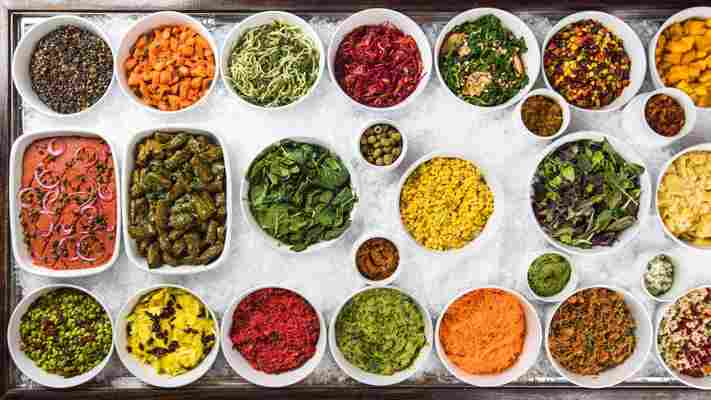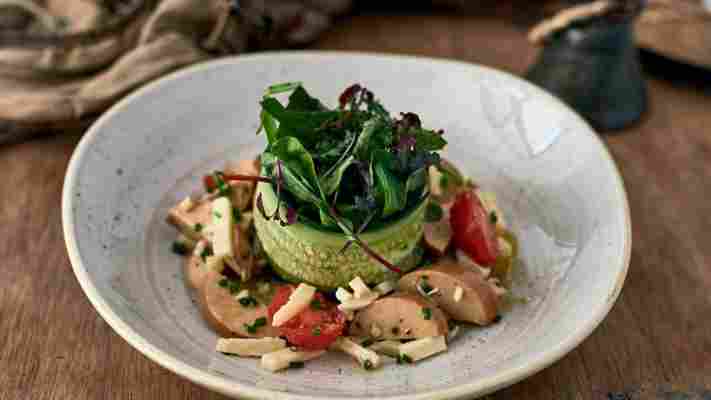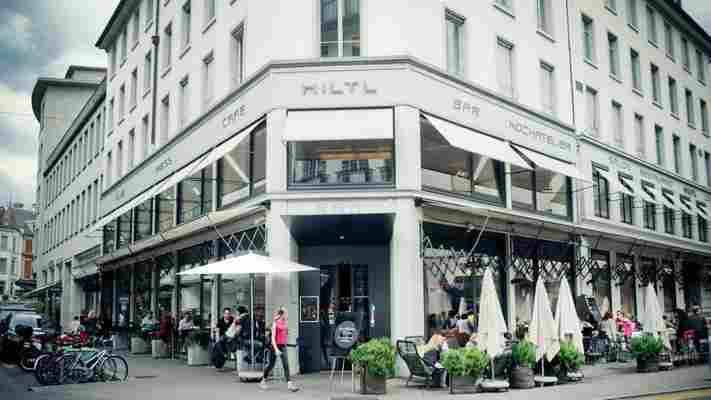It’s lunchtime in the historical heart of Zürich, Switzerland, and just off the bustling shopping street of Bahnhofstrasse, the bright and airy interior of Haus Hiltl restaurant is buzzing with activity. Tantalising aromas fill the air as diners line up at the 100-dish buffet to savour homemade vegetarian and vegan dishes from around the world.

I load my plate with a layer of crisp greens, spiced legumes and dollops of richly spiced paneer and chickpea curries. I add chilli-marinated tofu and a crunch of cashews, but am sure to leave room for my personal favourite: the jalapeño poppers, moreish bites of chilli heat and velvety cream cheese encased in crunchy breadcrumbs. By the end, my plate is a mountainous platter, with every morsel of its textured ridges and herb-seasoned peaks bursting with distinct flavours that the Hiltl family has been perfecting for more than 100 years.

Haus Hiltl has been serving vegetarian fare in Zürich, Switzerland, for more than 100 years (Credit: Haus Hiltl)
Haus Hiltl’s boundary-pushing menus have introduced generations of Swiss and Europeans to a rich ratatouille of vegetarian options
Today, Haus Hiltl isn’t just one Zürich’s most popular dining options; it’s recognised by Guinness World Records as the world’s oldest continuously run vegetarian restaurant – a gourmet temple of ‘healthy indulgence’, founded in 1898 and operated by the fourth generation of the Hiltl family. Combining Indian, Asian, Mediterranean and Swiss influences, Haus Hiltl’s boundary-pushing menus have introduced generations of Swiss and Europeans to a rich ratatouille of vegetarian options beyond potatoes and root vegetables since it first opened its doors.
You may also be interested in: • The soup that united Switzerland • Is this the world’s oldest pub? • A New York restaurant unlike any other
Downstairs, Haus Hiltl’s informal pay-by-weight buffet is a hubbub of activity, while its first floor à-la-carte restaurant, with its white tablecloths, expansive windows and an entire wall filled with shelves of cookbooks, offers a more refined space to soak up the ambiance. In the past decade, the Hiltl brand has expanded to eight branches across Zürich. Yet, in a meat-loving country, the idea of opening a vegetarian restaurant required decades to take root.

Haus Hiltl is recognised by Guinness World Records as the world’s oldest continuously run vegetarian restaurant (Credit: Haus Hiltl)
Zürich’s German-influenced cuisine has always been characterised by hearty pork and veal dishes, of which Zürcher geschnetzeltes – a creamy veal and mushroom ragout that translates as ‘Zürich-style sliced meat’ – is perhaps the most famous. When the restaurant opened in the late 19th Century, vegetarians were often mocked by Swiss elites as ‘herbivores’ and ‘grazers’. According to journalist and author of Das Kulinarische Erbe der Schweiz (The Culinary Heritage of Switzerland) Paul Imhof , meat was typically the most desired element of each meal throughout Central Europe – a trend that was linked to income as much as culinary preference. And meat-free ingredients were limited to little more than potatoes, cheese and root vegetables.
In fact, were it not for a travelling German tailor named Ambrosius Hiltl with a bad bout of rheumatism, Switzerland’s veritable garden of gastronomy would never have sprouted. Several years after the Bavarian-born tailor settled in Zürich in the late 1890s, a doctor diagnosed him with severe rheumatoid arthritis. Not only was Ambrosius no longer able to sew, but the doctor told him that unless he gave up meat he’d likely die prematurely. In those days, meat-free meals were hard to come by, so the 24-year-old wandered into the one place where he knew he’d find them: the Vegetarierheim and Abstinence-Café, Zürich’s only vegetarian restaurant – dubbed the ‘root bunker’ by locals.
Not only did Ambrosius fall in love with the vegetarian dishes, which he claimed led him to a rapid recovery, but also with the woman making them. He jumped at the chance to take over ownership of the ailing restaurant in 1904; married the cafe’s cook, Martha Gneupel, shortly after; and renamed the place Haus Hiltl.
Haus Hiltl’s buffet features 100 different homemade vegetarian and vegan dishes from around the world (Credit: Haus Hiltl)
That same year, as the ‘life-reform movement’ – which proposed that vegetarianism brought one closer to nature – was beginning to sweep through Switzerland, the charismatic Dr Maximilian Bircher-Benner opened up a health sanatorium in the foothills outside Zürich. An advocate of the healing powers of nutrition, Bircher-Benner also championed a meat-free diet and invented the now-iconic Swiss breakfast food, muesli.
This increasing public interest in healthy living, coupled with Ambrosius’ outgoing personality, helped bring in a few more customers, but the restaurant struggled financially in its early years, according to the current owner Rolf Hiltl. “My great-grandfather was a man who loved people; a man who attracted important people… but [vegetarianism] wasn’t mainstream at that time,” he said.
Indian cuisine is an ‘El Dorado’ for vegetarians
It wasn’t until 1951 that the current restaurant really took shape. That year, Ambrosius’ daughter-in-law Margrith travelled to Delhi as Switzerland’s official delegate to the World Vegetarian Congress and fell in love with Indian flavours. Returning with bags of spices like coriander, cardamom, turmeric and cumin, Margrith began to cook some of Switzerland’s only Indian-accented dishes for diners by special request from her private kitchen in Haus Hiltl.
As Margrith taught her kitchen staff how to prepare her dishes, a steady stream of Indian guests and celebrities started flocking to the restaurant – including former Indian Prime Minister Morarji Desai, years later. Swissair even approached Haus Hiltl to become the official provider of vegetarian meals for its passengers (the airline, now known as Swiss, still serves vegetarian meals in collaboration with Haus Hiltl to this day), which further increased the restaurant’s reputation beyond Zürich.
Haus Hiltl struggled financially in its early years despite increasing public interest in healthy living among the Swiss (Credit: Haus Hiltl)
Today, many of the dishes Margrith pioneered that were once believed to be too exotic for a Swiss public used to boiled potatoes, cheese and salads, are still served at Haus Hiltl. One of which is her thali platter: a variety of curries served with ginger raita, mango pickles, coconut chutney and helpings of rice, crispy poppadum flatbread and naan. The restaurant also serves a signature dish of banana madras, which comes with a zing of mango and a sprinkling of cashews.
“[Margrith Hiltl] realised that Indian cuisine is an ‘El Dorado’ for vegetarians,” Imhof said. “That was surprising for the society at that time.”
By the time Rolf’s father, Heinz Hiltl, was running Haus Hiltl in the 1960s, Zürich had changed so much that the restaurant, once surrounded by a small forest, was now firmly in the city centre. Zürich hadn’t just transformed physically, but people’s ideas towards vegetarian food were evolving, too. To keep pace and help attract younger diners, in 1973 Heinz launched a modern vegetarian concept at the restaurant called Hiltl Vegi, which included a salad bar, takeaway counter and a range of pressed juices – which were all firsts for Zürich, according to Rolf.
“Everybody knows Hiltl and the amazing things they can do with vegetarian or vegan ingredients,” said Lukas Fueglister, editor and publisher of the city guide Zürich In Your Pocket . “The fact that it seems to be the oldest vegetarian restaurant in the world is certainly good for them to market the place, but for today’s Zürich, I think it’s more important that Hiltl keeps being an innovative player in the city’s gastronomy scene.”
Once Indian flavours were introduced to the menu 1951, Haus Hiltl really took shape (Credit: Haus Hiltl)
More than a century after first opening its doors, Haus Hiltl is still offering new takes on vegetarian cuisine. “We have our roots and our values will stay, but we have to do things in the ways of 2019, not 1898,” Rolf said. “We’re always trying new things.”
According to Rolf, a flexitarian himself, roughly 80% of the restaurant’s diners aren’t vegetarian, which speaks to the broad appeal of its internationally inspired menu, as well as the creative interpretations of Swiss classics, like their vegetarian version of Zürcher geschnetzeltes made with organic seitan. “The greatest appraisal we can have is that people come who aren’t vegetarians, and don’t even realise that [the dishes are] vegetarian,” Rolf said. “That’s our mission, actually.”
To further the restaurant’s philosophy of ‘healthy indulgence’, Rolf opened The Hiltl Academy on the fifth floor of Haus Hiltl in 2015, where food-lovers and professional chefs can take vegan and vegetarian cooking classes. There’s even a course dedicated to Margrith’s Indian-inspired dishes. Rolf has also released a series of vegetarian and vegan cookbooks, and opened Switzerland’s first vegetarian ‘butcher’ next door to Haus Hiltl, which serves slices and slabs of tofu, seitan and tempeh, as well as popular Haus Hiltl delicacies like their Zürcher geschnetzeltes and aubergine tartare. There are even plans to open a flagship restaurant in either New York or Los Angeles in the future.
According to current owner Rolf Hiltl, roughly 80% of the restaurant’s diners aren’t vegetarian (Credit: Haus Hiltl)
By the time the lunch rush ends, I’ve savoured a veritable world atlas of vegetarian delicacies. I wonder what Ambrosius would think of the trendsetting restaurant today, and how far it’s come. Then, like a true ‘grazer’, I wander over to the dessert tray and place a slice of Haus Hiltl’s classic tangy lemon cheesecake on my plate.
Join more than three million BBC Travel fans by liking us on Facebook , or follow us on Twitter and Instagram .
If you liked this story, sign up for the weekly bbc.com features newsletter called "If You Only Read 6 Things This Week". A handpicked selection of stories from BBC Future, Culture, Capital and Travel, delivered to your inbox every Friday.
